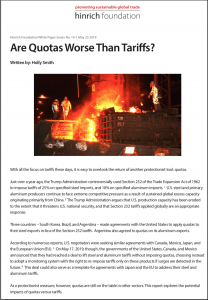Published 23 May 2019 | 1 minute read
With all the focus on tariffs these days, it is easy to overlook the return of another protectionist tool: quotas.
Just over a year ago, the Trump Administration controversially used Section 232 of the Trade Expansion Act of 1962 to impose tariffs of 25% on specified steel imports, and 10% on specified aluminum imports. U.S. steel and primary aluminum producers continue to face extreme competitive pressure as a result of sustained global excess capacity originating primarily from China. The Trump Administration argues that U.S. production capacity has been eroded to the extent that it threatens U.S. national security, and that Section 232 tariffs applied globally are an appropriate response.
Three countries – South Korea, Brazil, and Argentina – made agreements with the United States to apply quotas to their steel exports in lieu of the Section 232 tariffs. Argentina also agreed to quotas on its aluminum exports.
According to numerous reports, U.S. negotiators were seeking similar agreements with Canada, Mexico, Japan, and the European Union (EU). On May 17, 2019, though, the governments of the United States, Canada, and Mexico announced that they had reached a deal to lift steel and aluminum tariffs without imposing quotas, choosing instead to adopt a monitoring system with the right to re-impose tariffs only on these products if surges are detected in the future. This deal could also serve as a template for agreements with Japan and the EU to address their steel and aluminum tariffs.
As a protectionist measure, however, quotas are still on the table in other sectors. This report explores the potential impacts of quotas versus tariffs.
© The Hinrich Foundation. See our website Terms and conditions for our copyright and reprint policy. All statements of fact and the views, conclusions and recommendations expressed in this publication are the sole responsibility of the author(s).





